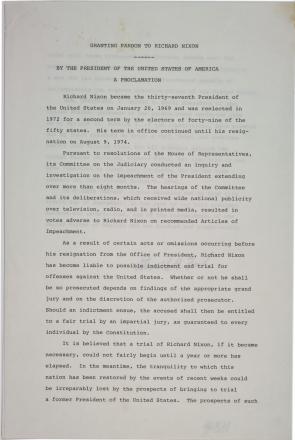Proclamation pardoning Richard Nixon, 1974
A Spotlight on a Primary Source by Gerald R. Ford
 "My fellow Americans, our long national nightmare is over."
"My fellow Americans, our long national nightmare is over."
Speaking half an hour after Richard Nixon submitted his resignation letter to Secretary of State Henry Kissinger on August 9, 1974, and minutes after taking the oath of office, President Gerald Ford began the difficult work of restoring the American people’s confidence in its government, giving a short speech that attempted to put the crisis caused by the Watergate scandal in the past. In addition to declaring an end to the nightmare, President Ford also urged a restoration of "the golden rule in our political process" and asked the public to pray for the Nixon family.
A month later, on September 8, President Ford issued a proclamation granting a "full, free, and absolute pardon" to Nixon extending to any actions he had taken throughout his entire presidency. In a televised address that night, in which he explained that he thought that someone needed to put an end to the Nixon tragedy, he also introduced a conditional amnesty program for Vietnam War draft dodgers. The contrast proved too much for President Ford’s press secretary, who resigned in protest. The American public was also outraged by the pardon to a degree President Ford had not been expecting, and a month later, he voluntarily became the first president to appear before a Congressional committee to explain his decision-making process.
James Cannon, an advisor to President Ford, revealed in a late 2006 New York Times article that President Ford privately justified pardoning Nixon with a 1915 Supreme Court decision, a copy of which he carried in his wallet. Pardons, the Court ruled, implied guilt, and accepting a pardon "is an admission of it."
